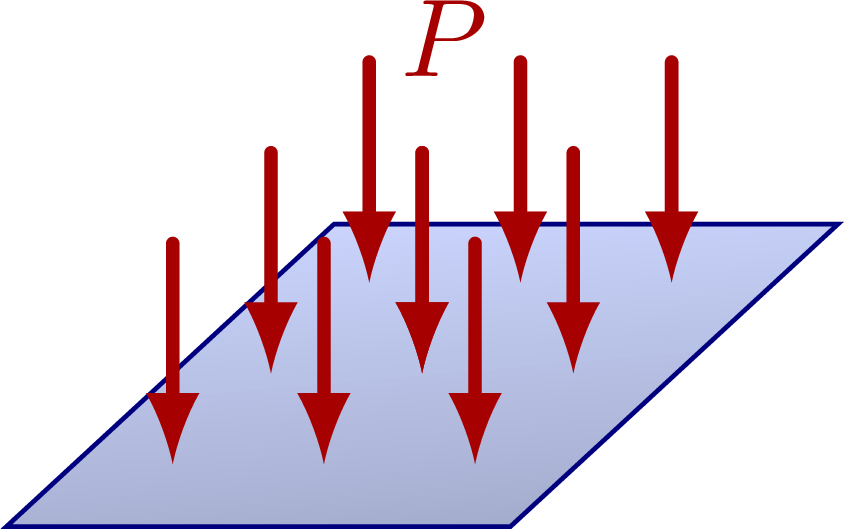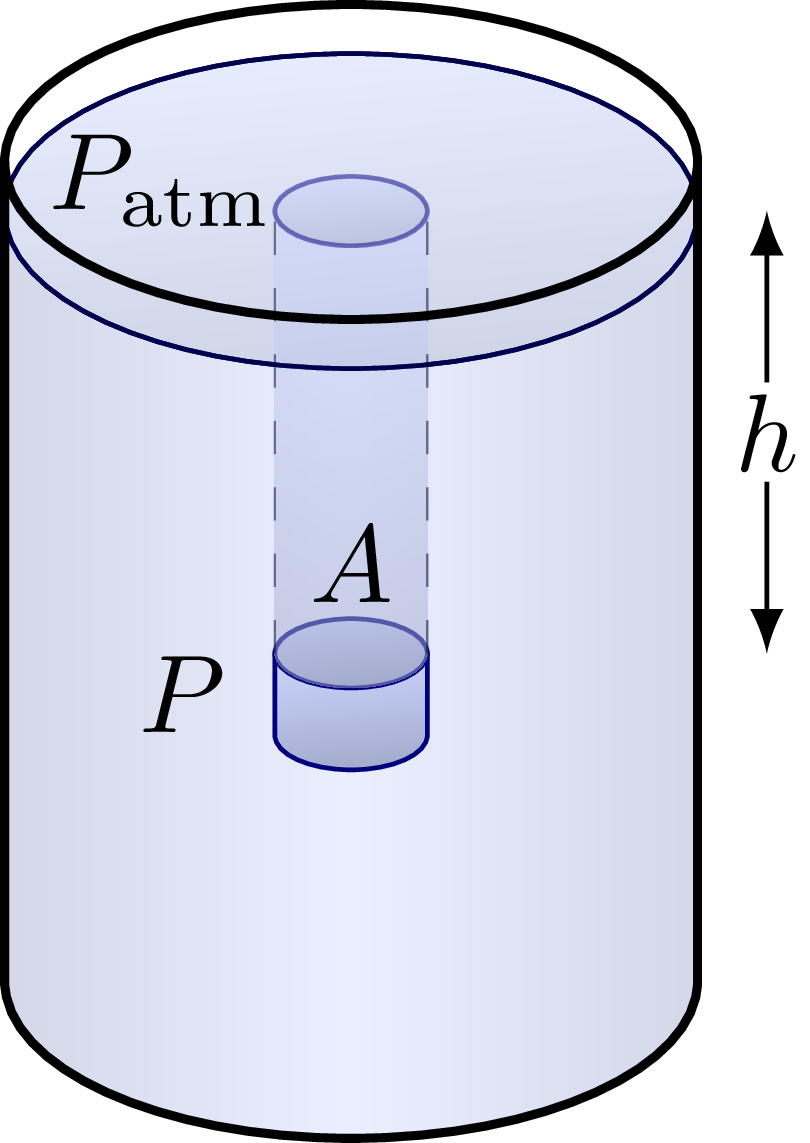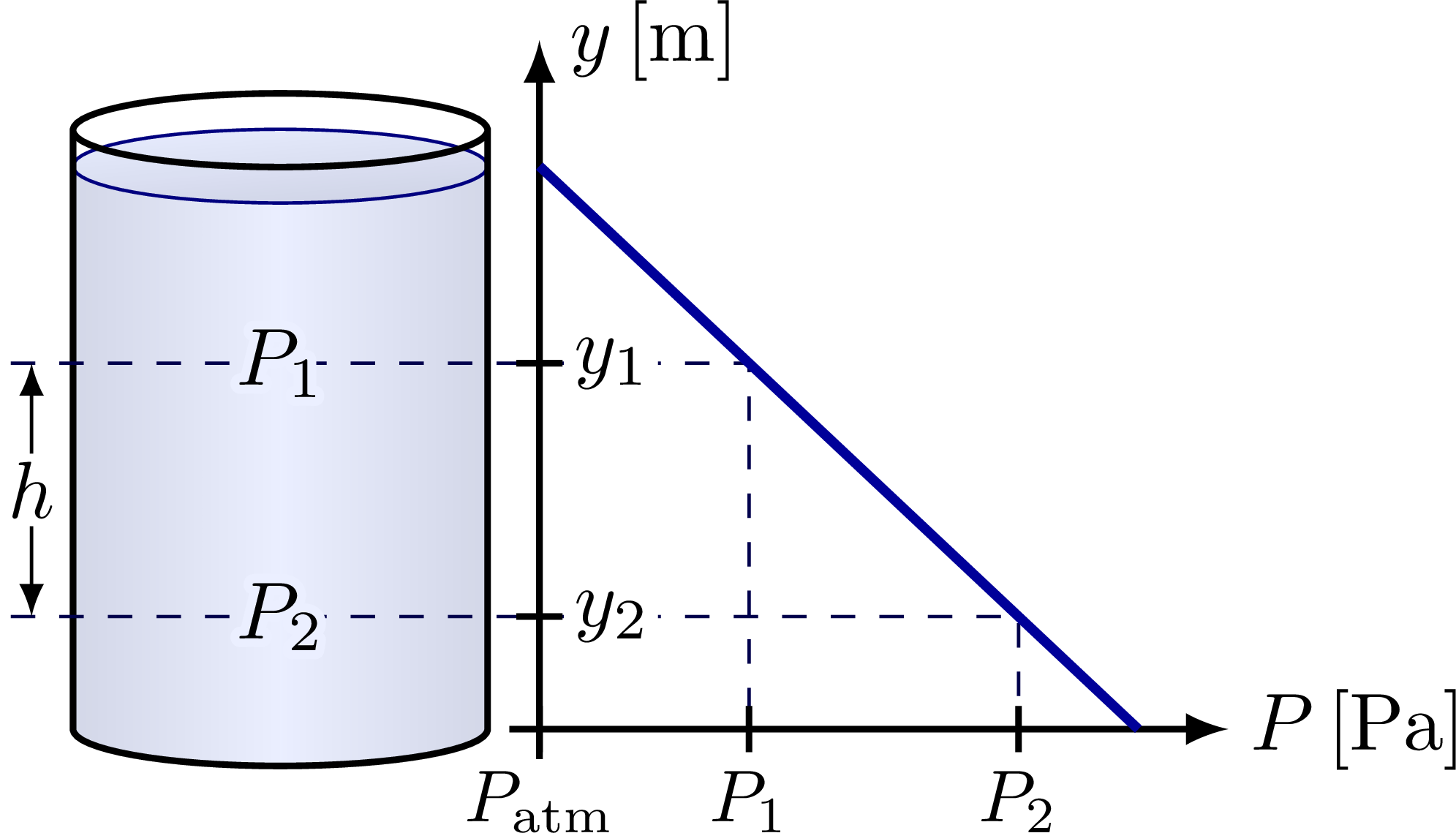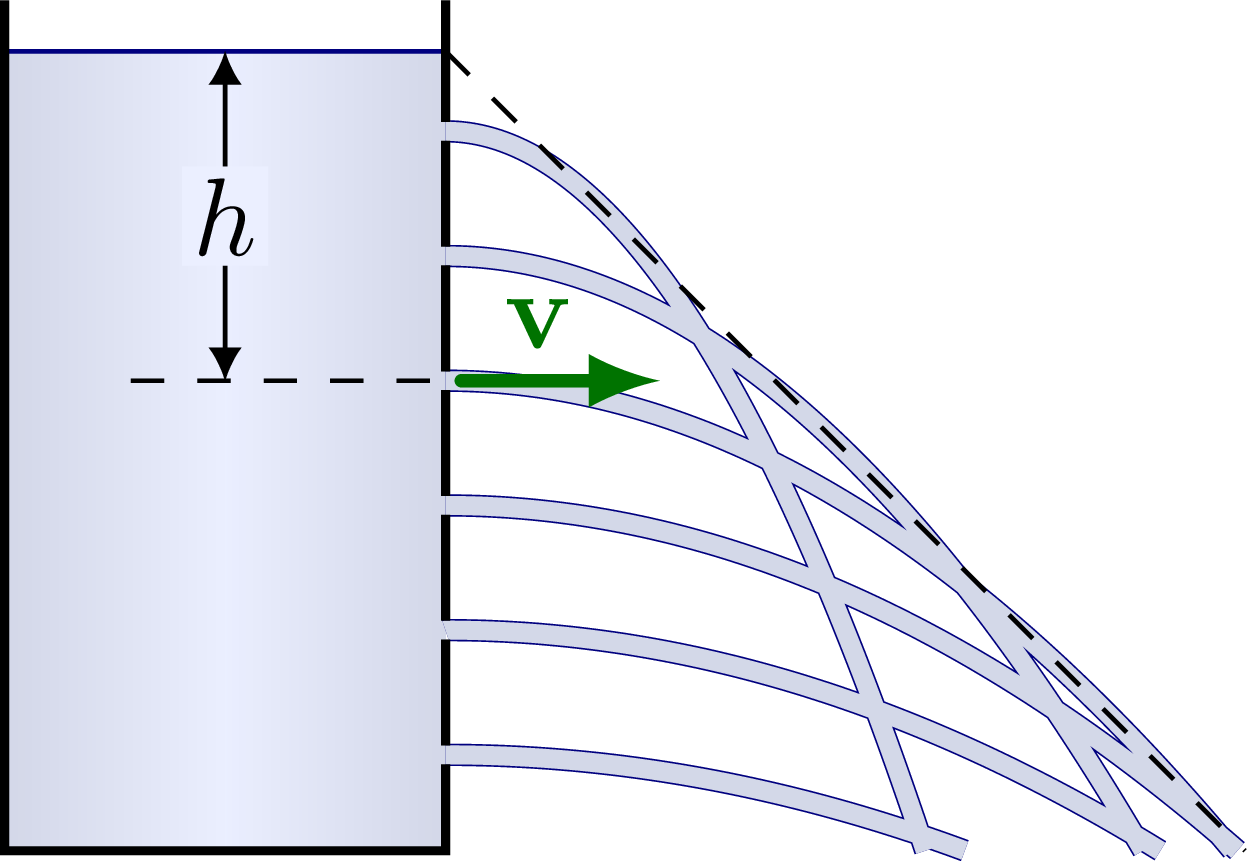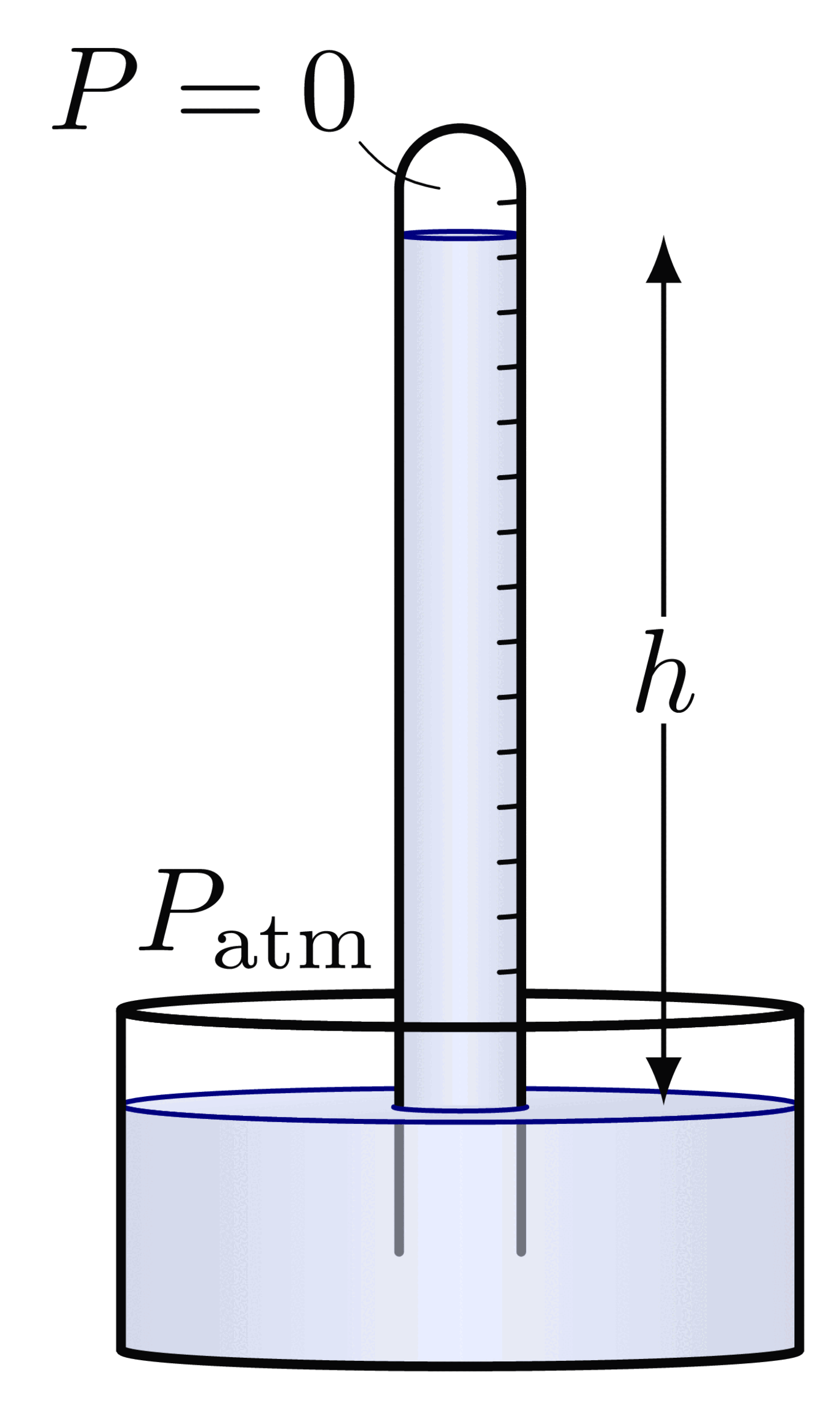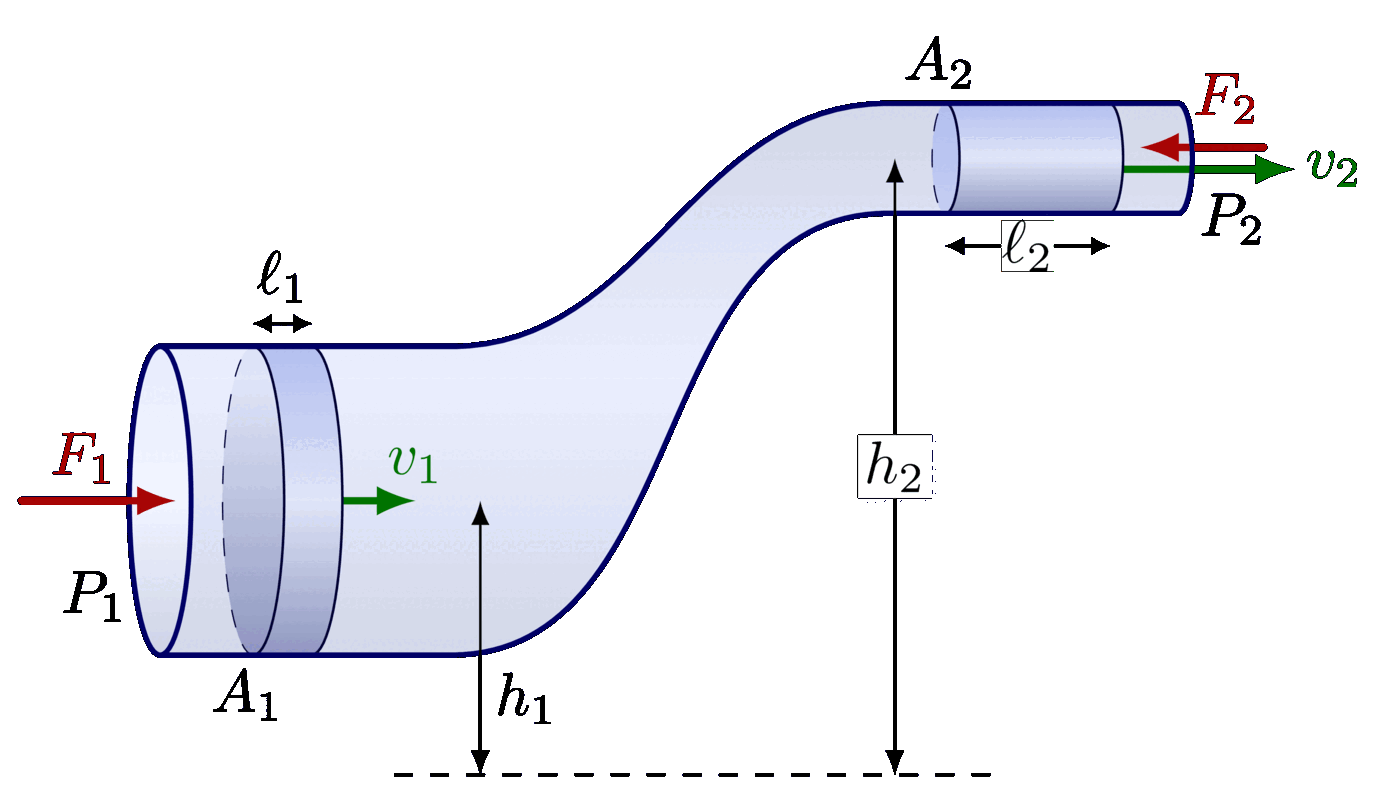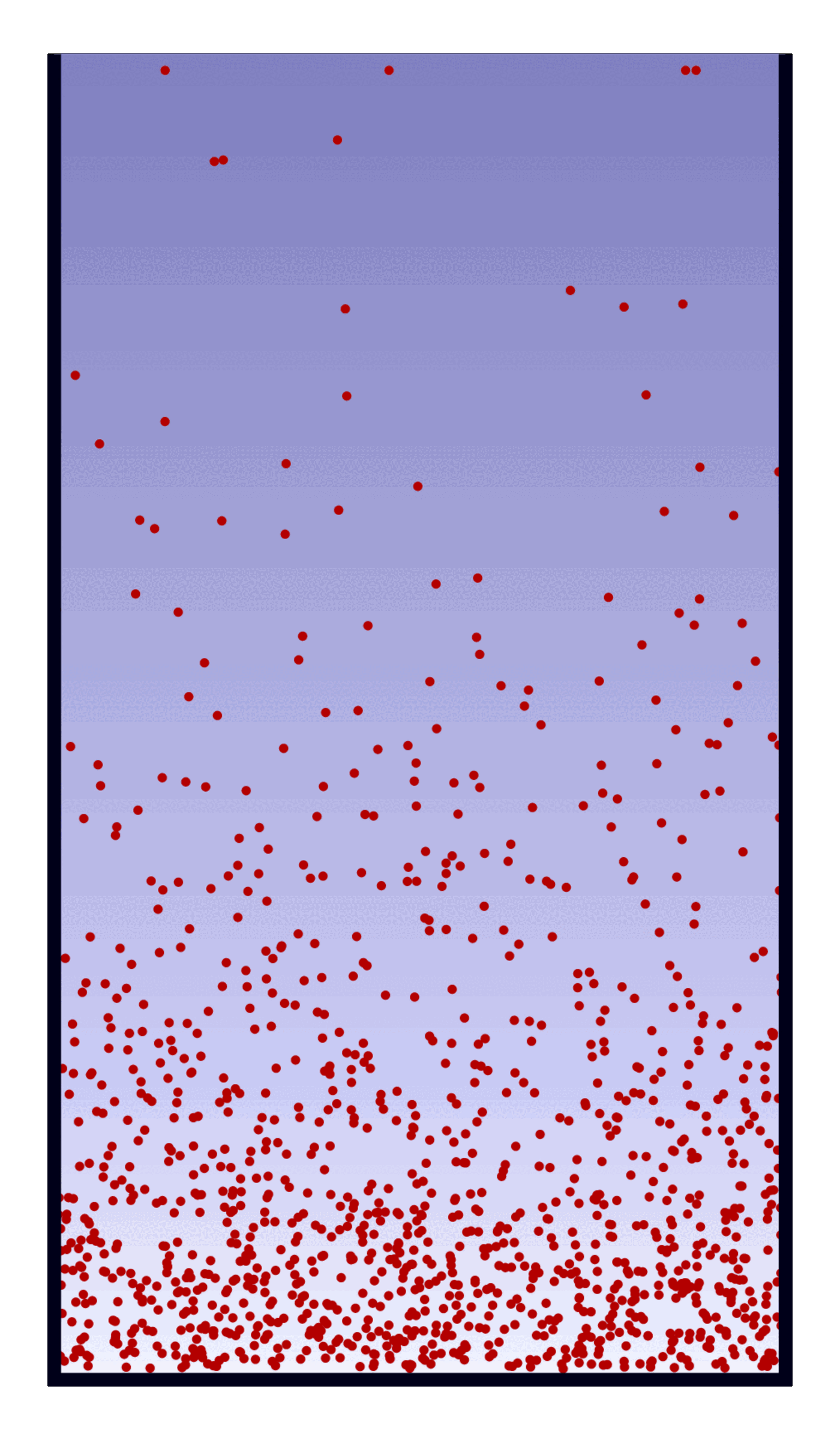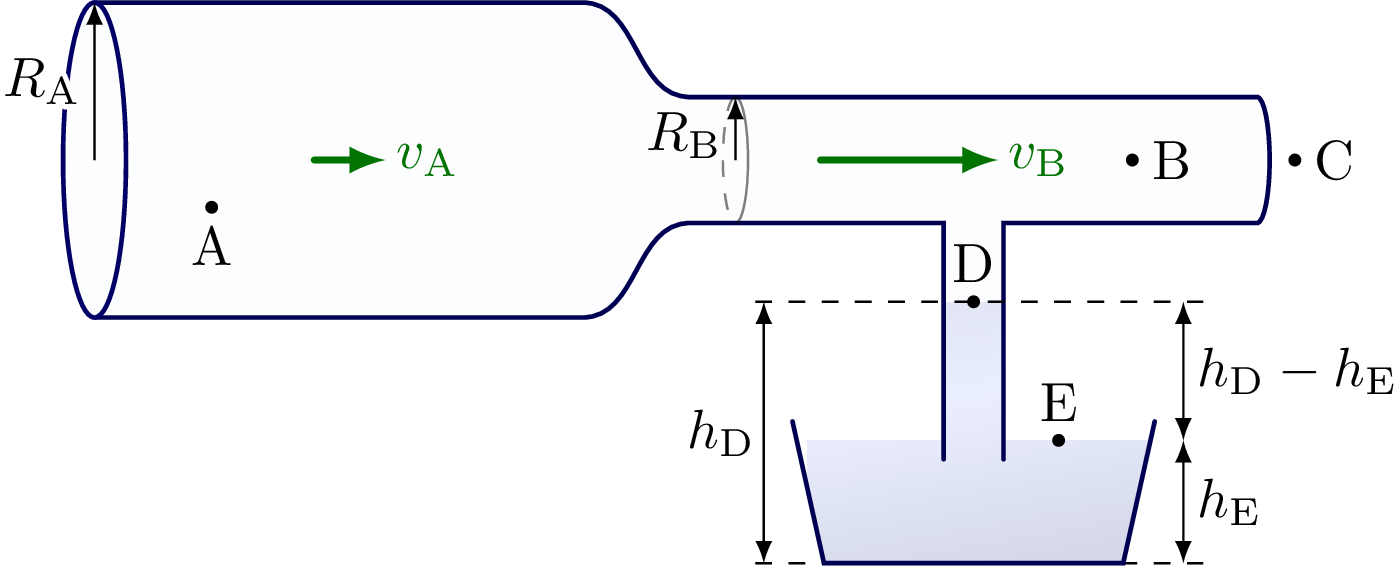Some basic diagrams to explain pressure, pressure variation over depth, Torricelli’s law and Pascal’s principle.
For more related figures, please have a look at the Fluid Dynamics category.
Pascal’s principle (or Pascal’s law):
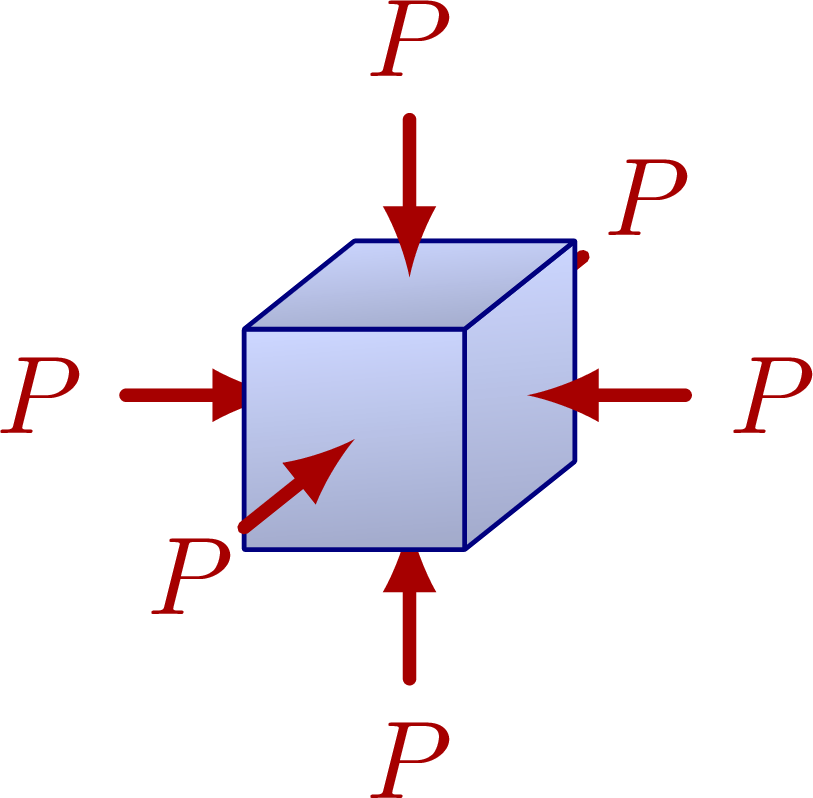
Forces on a container with a fluid:

Pressure variation over depth:
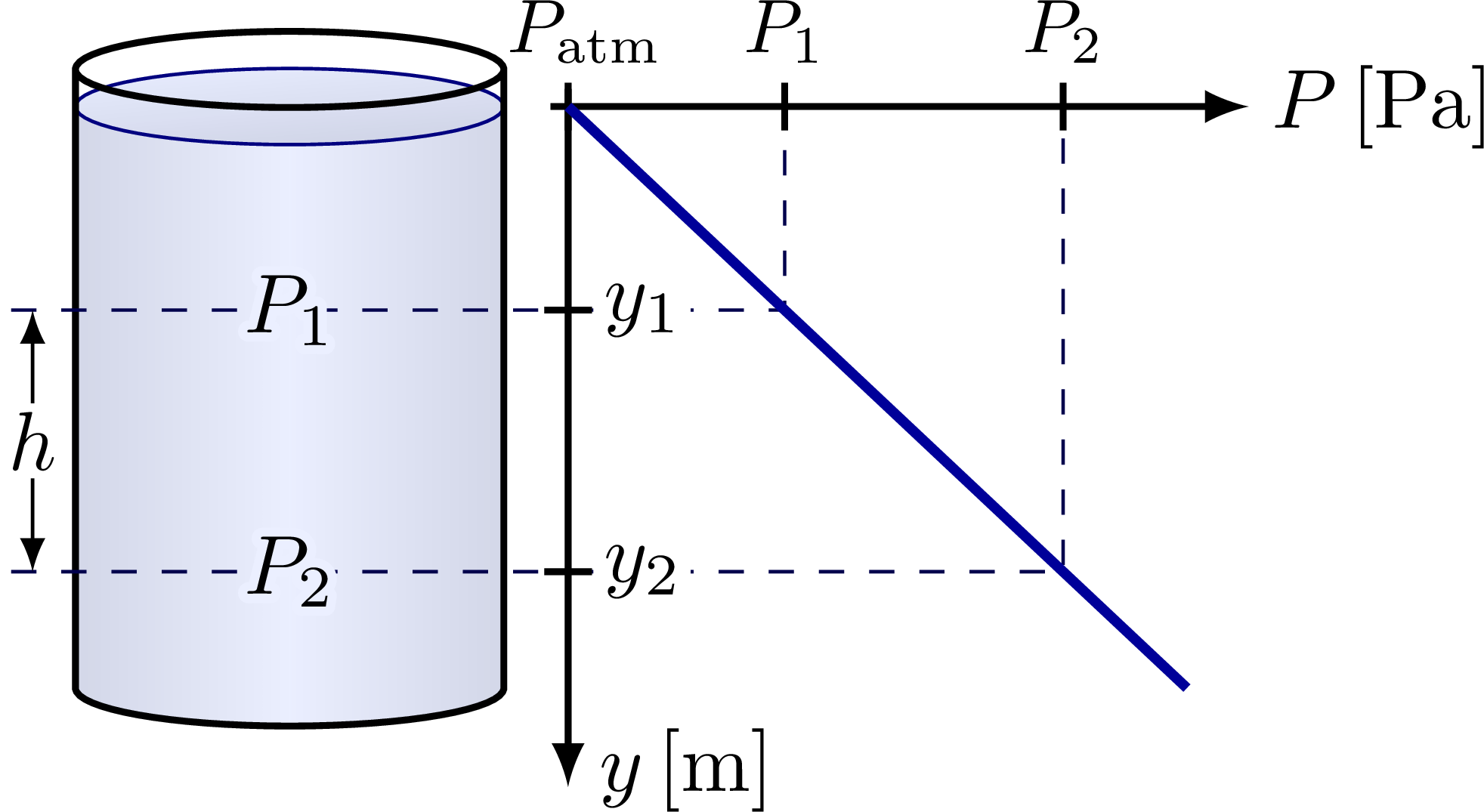
Pascal’s principle in to understand a hydraulic press:
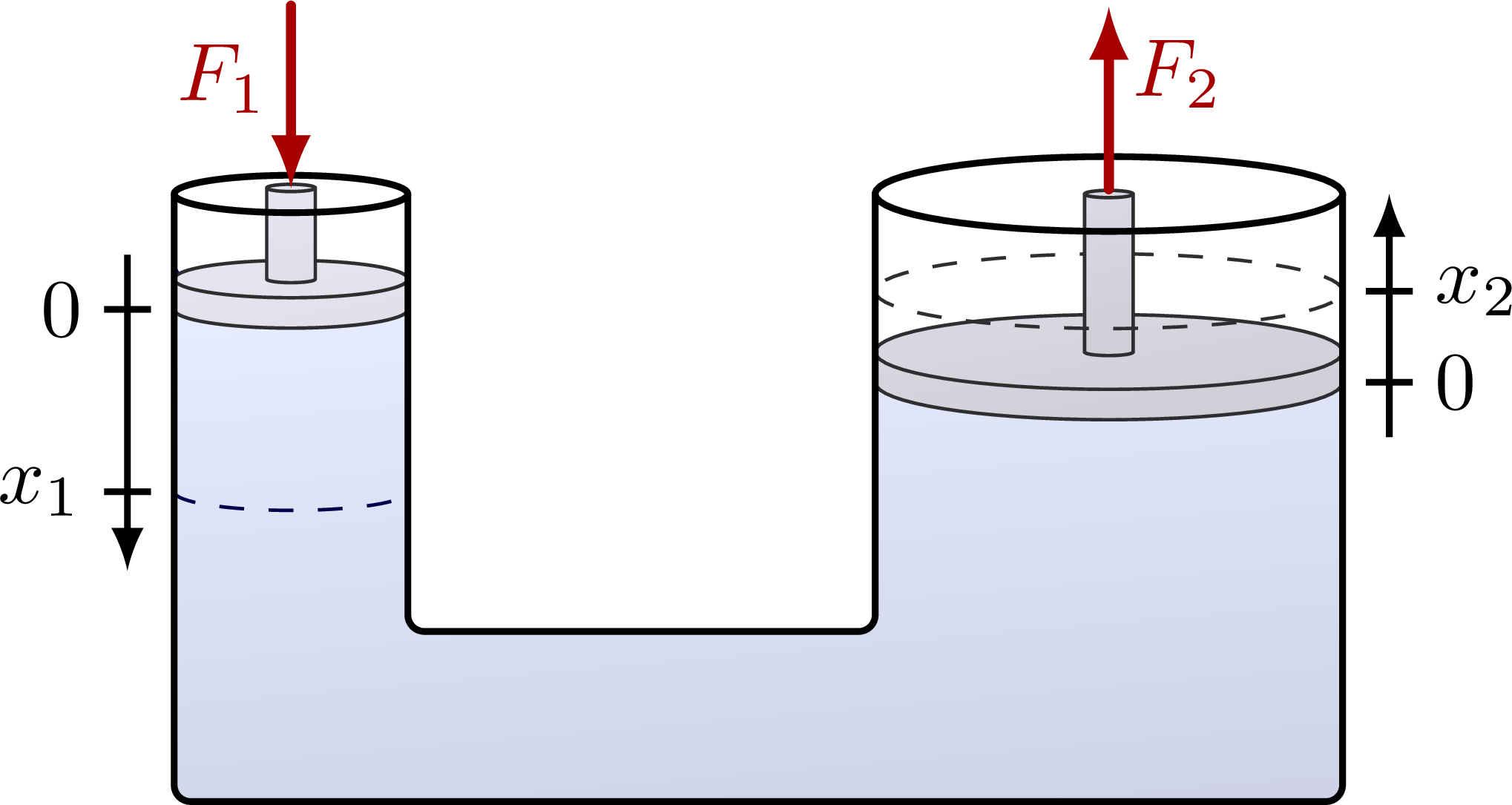
Edit and compile if you like:
% Author: Izaak Neutelings (November 2020)
\documentclass[border=3pt,tikz]{standalone}
\usepackage{siunitx}
\usepackage{physics}
\usepackage{tikz}
\usepackage[outline]{contour} % glow around text
\usetikzlibrary{patterns,decorations.pathmorphing}
\usetikzlibrary{arrows.meta}
\tikzset{>=latex}
\contourlength{1.1pt}
\colorlet{mydarkblue}{blue!50!black}
\colorlet{myred}{red!65!black}
\colorlet{vcol}{green!45!black}
\colorlet{watercol}{blue!80!cyan!10!white}
\colorlet{darkwatercol}{blue!80!cyan!20!white}
\colorlet{metalcol}{blue!40!black!10!white}
\tikzstyle{force}=[->,myred,very thick,line cap=round]
\tikzstyle{vvec}=[->,very thick,vcol,line cap=round]
\tikzstyle{piston}=[blue!50!black,top color=blue!30,bottom color=blue!50,middle color=blue!20,shading angle=0]
\tikzstyle{water}=[draw=mydarkblue,top color=watercol!90,bottom color=watercol!90!black,shading angle=5]
\tikzstyle{vertical water}=[water,
top color=watercol!90!black!90,bottom color=watercol!90!black!90,middle color=watercol!80,shading angle=90]
\tikzstyle{dark water}=[draw=mydarkblue,top color=darkwatercol,bottom color=darkwatercol!80!black,shading angle=5]
\tikzstyle{metal}=[draw=metalcol!20!black,top color=metalcol,bottom color=metalcol!90!black,shading angle=10]
\tikzstyle{width}=[{Latex[length=3,width=3]}-{Latex[length=3,width=3]}]
\def\tick#1#2{\draw[thick] (#1)++(#2:0.1) --++ (#2-180:0.2)}
\begin{document}
% PRESSURE
\begin{tikzpicture}[x={(1cm,0)},y={(0.65cm,0.6cm)},z={(0,1cm)}]
\def\L{1.6} % cube side
\def\P{0.7} % pressure size
\draw[dark water] (0,0,0) -- (\L,0,0) -- (\L,\L,0) -- ( 0,\L,0) -- cycle;
\draw[force] (0.5*\L,0.5*\L,1.01*\P) node[right=2,above=3] {$P$} --++ (0,0,-\P);
\foreach \x/\y in {0.5/0.5,0.5/0.2,0.2/0.5,0.5/0.8,0.8/0.5,0.8/0.8,0.2/0.8,0.2/0.2,0.8/0.2}{
\draw[force] (\x*\L,\y*\L,1.01*\P) --++ (0,0,-\P);
}
\end{tikzpicture}
% PRESSURE DIRECTIONS - Pascal's principle
\begin{tikzpicture}[x={(1cm,0)},y={(0.5cm,0.4cm)},z={(0,1cm)}]
\def\L{0.7} % cube side
\def\P{0.5} % pressure size
\draw[force] (\L/2,\L/2,-1.1*\P) node[below] {$P$} --++ (0,0,\P);
\draw[force] (-1.1*\P,\L/2,\L/2) node[left] {$P$} --++ ( \P,0,0);
\draw[force] (\L/2,\L+1.5*\P,\L/2) node[above right=-2] {$P$} --++ (0,-1.4*\P,0);
\draw[dark water,rounded corners=0.1] (\L,0, 0) -- (\L,0,\L) -- (\L,\L,\L) -- (\L,\L, 0) -- cycle;
\draw[dark water,rounded corners=0.1] ( 0,0, 0) -- ( 0,0,\L) -- (\L, 0,\L) -- (\L, 0, 0) -- cycle;
\draw[dark water,rounded corners=0.1] ( 0,0,\L) -- (\L,0,\L) -- (\L,\L,\L) -- ( 0,\L,\L) -- cycle;
\draw[force] (\L/2,\L/2,\L+1.05*\P) node[above] {$P$} --++ (0,0,-\P);
\draw[force] (\L+1.05*\P,\L/2,\L/2) node[right] {$P$} --++ (-\P,0,0);
\draw[force] (\L/2,-1.4*\P,\L/2) node[below left=-3] {$P$} --++ (0,1.4*\P,0);
\end{tikzpicture}
% WATER COLUMN WEIGHT
\begin{tikzpicture}
\def\Rx{0.9} % tank horizontal radius
\def\Ry{0.3} % tank vertical radius
\def\H{2.6} % height tank
\def\h{0.94*\H} % height water
\def\y{0.40*\H} % vertical position piece
\def\F{0.45*\h} % force
% WATER
\draw[vertical water]
(-\Rx,\h) -- (-\Rx,0) arc (180:360:{\Rx} and {\Ry}) -- (\Rx,\h);
\draw[water]
(0,\h) ellipse ({\Rx} and {\Ry});
% CONTAINER
\draw[thick]
(-\Rx,\H) -- (-\Rx,0) arc (180:360:{\Rx} and {\Ry}) -- (\Rx,\H);
\draw[thick]
(0,\H) ellipse ({\Rx} and {\Ry});
% LABELS
\draw[force] (-0.1*\Rx,\h/2) --++ (0,-0.3*\F) node[midway,left] {$mg$};
\draw[force] (0.1*\Rx,-0.8*\Ry) --++ (0,\F) node[midway,right] {$\vb{F}_\mathrm{N}$};
\draw[force] (0.0*\Rx,\h-1.2*\Ry) --++ (0,-0.7*\F) node[midway,right] {$\vb{F}_\mathrm{atm}$};
\node[right] at (1.1*\Rx,\H) {$P_0=P_\mathrm{atm}$}; %{\contour{watercol}{$P_\mathrm{atm}$}};
\node[right] at (1.1*\Rx,0) {$P$};
\node[above=-4] at (0,\h) {$A$};
\draw[<->] (-1.2*\Rx,0) --++ (0,\h) node[midway,fill=white,inner sep=1] {$h$};
\end{tikzpicture}
% WATER COLUMN WEIGHT
\begin{tikzpicture}
\def\Rx{1.1} % tank horizontal radius
\def\Ry{0.5} % tank vertical radius
\def\rx{0.22*\Rx} % column horizontal radius
\def\ry{0.22*\Ry} % column vertical radius
\def\H{2.6} % height tank
\def\h{0.94*\H} % height water
\def\y{0.40*\H} % vertical position piece
\def\dy{0.10*\H} % height piece
% WATER
\draw[vertical water]
(-\Rx,\h) -- (-\Rx,0) arc (180:360:{\Rx} and {\Ry}) -- (\Rx,\h);
\draw[water]
(0,\h) ellipse ({\Rx} and {\Ry});
% COLUMN + PIECE
\draw[dark water]
(-\rx,\y) -- (-\rx,\y-\dy) arc (180:360:{\rx} and {\ry}) -- (\rx,\y);
\draw[dark water]
(0,\y) ellipse ({\rx} and {\ry});
\draw[dark water,opacity=0.50,draw=none] % column
(-\rx,\h) -- (-\rx,\y) arc (180:360:{\rx} and {\ry}) -- (\rx,\h) arc(360:180:{\rx} and {\ry}) -- cycle;
\draw[blue!20!black,dashed,very thin,opacity=0.50] (-\rx,\y) -- (-\rx,\h) (\rx,\y) -- (\rx,\h);
\draw[dark water,opacity=0.50] % top column
(0,\h) ellipse ({\rx} and {\ry});
\draw[blue!30!black]
(0,\h) ellipse ({\Rx} and {\Ry});
% CONTAINER
\draw[thick]
(-\Rx,\H) -- (-\Rx,0) arc (180:360:{\Rx} and {\Ry}) -- (\Rx,\H);
\draw[thick]
(0,\H) ellipse ({\Rx} and {\Ry});
% LABELS
\node[scale=0.98] at ({-0.45*(\Rx+\rx)},1.04*\h) {$P_\mathrm{atm}$}; %{\contour{watercol}{$P_\mathrm{atm}$}};
\node at ({-0.40*(\Rx+\rx)},{\y-0.5*\dy}) {$P$};
\node[above=-2] at (0,\y+\ry) {$A$};
\draw[<->] (1.2*\Rx,\y) --++ (0,\h-\y) node[midway,fill=white,inner sep=1] {$h$};
\end{tikzpicture}
% PRESSURE HEIGTH DIFFERENCE
\begin{tikzpicture}
\def\Rx{0.9} % tank horizontal radius
\def\Ry{0.16} % tank vertical radius
\def\H{2.6} % height tank
\def\h{0.94*\H} % height water
\def\ya{0.65*\h} % vertical position A
\def\yb{0.20*\h} % vertical position B
% WATER
\draw[vertical water]
(-\Rx,\h) -- (-\Rx,0) arc (180:360:{\Rx} and {\Ry}) -- (\Rx,\h);
\draw[water]
(0,\h) ellipse ({\Rx} and {\Ry});
\draw[thick]
(-\Rx,\H) -- (-\Rx,0) arc (180:360:{\Rx} and {\Ry}) -- (\Rx,\H)
(0,\H) ellipse ({\Rx} and {\Ry});
% LABELS
%\node at ({-0.44*(\Rx+\rx)},1.04*\h) {$P_\mathrm{atm}$}; %{\contour{watercol}{$P_\mathrm{atm}$}};
%\node at ({-0.40*(\Rx+\rx)},{\y-0.5*\dy}) {$P$};
\draw[blue!30!black,dashed] (-1.3*\Rx,\ya) --++ (2.6*\Rx,0);
\draw[blue!30!black,dashed] (-1.3*\Rx,\yb) --++ (2.6*\Rx,0);
\draw[<->] (-1.2*\Rx,\yb) --++ (0,\ya-\yb) node[midway,fill=white,inner sep=1] {$h$};
\node at (0,\ya) {\contour{watercol!80}{$P_1$}};
\node at (0,\yb) {\contour{watercol!80}{$P_2$}};
% AXIS
\begin{scope}[shift={(1.3*\Rx,0)}]
\draw[->,thick] (-0.03*\h,\h) --++ (1.2*\h,0) node[right=-1] {$P$\,[Pa]};
\draw[->,thick] (0,1.03*\h) --++ (0,-1.2*\h) node[above=2,right] {$y$\,[m]};
\draw[blue!30!black,dashed] (0,\ya) -| ({\H-\H/(\h)*\ya},\h);
\draw[blue!30!black,dashed] (0,\yb) -| ({\H-\H/(\h)*\yb},\h);
\tick{0,\ya}{180} node[right=0,fill=white,inner sep=1] {$y_1$};
\tick{0,\yb}{180} node[right=0,fill=white,inner sep=1] {$y_2$};
%\tick{0,\h}{180}; %node[above=2,right=-1] {$h$};
\tick{0,\h}{-90} node[right=2,above=-1,scale=0.9] {$P_\mathrm{atm}$};
\tick{{\H-\H/(\h)*\ya},\h}{-90} node[above=-1,scale=0.9] {$P_1$};
\tick{{\H-\H/(\h)*\yb},\h}{-90} node[above=-1,scale=0.9] {$P_2$};
%\tick{0.8*\H,0}{90} node[below=-1,scale=0.9] {$P_\mathrm{atm}+\rho g H$};
\draw[blue!60!black,very thick] (0,\h) -- (\H,0);
\end{scope}
\end{tikzpicture}
% PRESSURE HEIGTH DIFFERENCE
\begin{tikzpicture}
\def\Rx{0.9} % tank horizontal radius
\def\Ry{0.16} % tank vertical radius
\def\H{2.6} % height tank
\def\h{0.94*\H} % height water
\def\ya{0.65*\h} % vertical position A
\def\yb{0.20*\h} % vertical position B
% WATER
\draw[vertical water]
(-\Rx,\h) -- (-\Rx,0) arc (180:360:{\Rx} and {\Ry}) -- (\Rx,\h);
\draw[water]
(0,\h) ellipse ({\Rx} and {\Ry});
\draw[thick]
(-\Rx,\H) -- (-\Rx,0) arc (180:360:{\Rx} and {\Ry}) -- (\Rx,\H)
(0,\H) ellipse ({\Rx} and {\Ry});
% LABELS
%\node at ({-0.44*(\Rx+\rx)},1.04*\h) {$P_\mathrm{atm}$}; %{\contour{watercol}{$P_\mathrm{atm}$}};
%\node at ({-0.40*(\Rx+\rx)},{\y-0.5*\dy}) {$P$};
\draw[blue!30!black,dashed] (-1.3*\Rx,\ya) --++ (2.6*\Rx,0);
\draw[blue!30!black,dashed] (-1.3*\Rx,\yb) --++ (2.6*\Rx,0);
\draw[<->] (-1.2*\Rx,\yb) --++ (0,\ya-\yb) node[midway,fill=white,inner sep=1] {$h$};
\node at (0,\ya) {\contour{watercol!80}{$P_1$}};
\node at (0,\yb) {\contour{watercol!80}{$P_2$}};
% AXIS
\begin{scope}[shift={(1.25*\Rx,0)}]
\draw[->,thick] (-0.05*\H,0) --++ (1.2*\H,0) node[right=-1] {$P$\,[Pa]};
\draw[->,thick] (0,-0.05*\H) --++ (0,1.2*\H) node[right] {$y$\,[m]};
\draw[blue!30!black,dashed] (0,\ya) -| ({\H-\H/(\h)*\ya},0);
\draw[blue!30!black,dashed] (0,\yb) -| ({\H-\H/(\h)*\yb},0);
\tick{0,\ya}{180} node[right=0,fill=white,inner sep=1] {$y_1$};
\tick{0,\yb}{180} node[right=0,fill=white,inner sep=1] {$y_2$};
%\tick{0,\h}{180}; %node[above=2,right=-1] {$h$};
\tick{0,0}{90} node[below=-1,scale=0.9] {$P_\mathrm{atm}$};
\tick{{\H-\H/(\h)*\ya},0}{90} node[below=-1,scale=0.9] {$P_1$};
\tick{{\H-\H/(\h)*\yb},0}{90} node[below=-1,scale=0.9] {$P_2$};
%\tick{0.8*\H,0}{90} node[below=-1,scale=0.9] {$P_\mathrm{atm}+\rho g H$};
\draw[blue!60!black,very thick] (0,\h) -- (\H,0);
\end{scope}
\end{tikzpicture}
% TORRICELLI
\begin{tikzpicture}
\def\W{1.4} % tank width
\def\H{2.7} % height tank
\def\h{0.94*\H} % height water
\def\t{0.06} % hole size
\def\ya{0.12*\h} % lowest hole
\def\yb{0.90*\h} % highest hole
\def\ym{{\ya+3*(\yb-\ya)/(\N-1)}} % indicated hole
\def\N{6} % number of holes
% WATER
\draw[vertical water,draw=none]
(-\W,0) rectangle++ (\W,\h);
\draw[mydarkblue] (-\W,\h) --++ (\W,0);
\draw[double=watercol!90!black!90,mydarkblue,double distance=1.7,line width=0.15]
\foreach \i [evaluate={\y=\ya+(\i-1)*(\yb-\ya)/(\N-1);}] in {1,...,\N}{ %;\v=1.2*sqrt(\h-\y)
plot[samples=100,smooth,variable=\x,domain=0:2*sqrt(\y*(\h-\y))](\x,{\y-\x*\x/4/(\h-\y)})
};
\draw[dashed] (0,\h) -- (\h,0);
\draw[dashed] (-0.05,\ym) --++ (-0.75*\W,0);
\draw[width]
(-0.5*\W,\h) -- (-0.5*\W,\ym)
node[midway,fill=watercol!80,inner sep=1] {$h$};
\draw[vvec] (0.05,\ym) --++ (0.45*\W,0) node[midway,left=2,above=-1] {$\vb{v}$}; %_0
% CONTAINER
\draw[thick]
(-\W,\H) |-++ (\W,-\H)
\foreach \i [evaluate={\y=\ya+(\i-1)*(\yb-\ya)/(\N-1)}] in {1,...,\N}{
-- (0,\y-\t/2) (0,\y+\t/2)
} -- (0,\H);
\end{tikzpicture}
% PRESSURE HEIGTH DIFFERENCE
\begin{tikzpicture}
\def\L{3.5} % distance pistons
\def\Lx{0.50} % left piston horizontal radius
\def\Ly{0.08} % left piston vertical radius
\def\Rx{1.00} % right piston horizontal radius
\def\Ry{0.16} % right piston vertical radius
\def\H{2.6} % height tank
\def\d{0.28*\H} % diameter connecting pipe
\def\hL{0.86*\H} % left height water
\def\hR{0.74*\H} % right height water
\def\pt{0.05*\H} % piston thickness
\def\prx{0.040*\H} % piston pole radius
\def\pry{0.006*\H} % piston pole radius
\def\pLl{0.15*\H} % left piston pole length
\def\pRl{0.26*\H} % right piston pole length
\def\xL{0.30*\H} % right piston displacement
\def\xR{\xL*\Lx/\Rx} % left piston displacement
\def\F{0.3*\H} % force magnitude
% WATER
\draw[water,rounded corners=2]
(-\Lx,\hL) |-++ (\L+\Lx+\Rx,-\hL) |-++ (-2*\Rx,\hR) |-++ %arc (360:180:{\Rx} and {\Ry}) --++
(-\L+\Lx+\Rx,-\hR+\d) |- cycle; %(-2*\Lx,\hL-\t) -- arc (360:180:{\Lx} and {\Ly}) -- cycle;
\draw[blue!30!black,dashed,thin] (-\Lx,\hL-\pt-\xL) arc(180:360:{\Lx} and {\Ly});
% PISTON
\draw[metal]
(-\Lx,\hL) --++ (0,-\pt) arc (180:360:{\Lx} and {\Ly}) --++ (0,\pt)
(\L-\Rx,\hR) --++ (0,-\pt) arc (180:360:{\Rx} and {\Ry}) --++ (0,\pt)
(0,\hL) ellipse ({\Lx} and {\Ly})
(\L,\hR) ellipse ({\Rx} and {\Ry});
\draw[metalcol!20!black,dashed,thin]
(\L+\Rx,\hR-\pt+\xR) arc(0:180:{\Rx} and {\Ry});
\draw[metal]
(-\prx,\hL+\pLl) --++ (0,-\pLl) arc (180:360:{\prx} and {\pry}) --++ (0,\pLl)
(\L-\prx,\hR+\pRl) --++ (0,-\pRl) arc (180:360:{\prx} and {\pry}) --++ (0,\pRl)
(0,\hL+\pLl) ellipse ({\prx} and {\pry})
(\L,\hR+\pRl) ellipse ({\prx} and {\pry});
\draw[metalcol!20!black,dashed,thin]
(\L-\Rx,\hR-\pt+\xR) arc(180:360:{\Rx} and {\Ry});
% CONTAINER
\draw[thick,rounded corners=2]
(-\Lx,\H) |-++ (\L+\Lx+\Rx,-\H) --++ (0,\H)
(\Lx,\H) |-++ (\L-\Lx-\Rx,-\H+\d) --++ (0,\H-\d);
\draw[thick]
(0,\H) ellipse ({\Lx} and {\Ly}) (\L,\H) ellipse ({\Rx} and {\Ry});
% FORCES
\draw[force] (0,\hL+\pLl+\F) --++ (0,-\F) node[pos=0.4,left=-1] {$F_1$};
\draw[force] (\L,\hR+\pRl+0.02) --++ (0,\F) node[midway,above=3,right=-1] {$F_2$};
% AXIS
\draw[->,thick] (-\Lx-0.2*\Rx,0.9*\H) --++ (0,-0.52*\H); %node[left] {$x_1$};
\draw[->,thick] (\L+1.2*\Rx,0.6*\H) --++ (0,0.40*\H); %node[right] {$x_2$};
\tick{-\Lx-0.2*\Rx,\hL-\pt}{0} node[left=-1] {$0$};
\tick{-\Lx-0.2*\Rx,\hL-\pt-\xL}{0} node[left=-1] {$x_1$};
\tick{\L+1.2*\Rx,\hR-\pt}{180} node[right=-1] {$0$};
\tick{\L+1.2*\Rx,{\hR-\pt+\xR}}{180} node[right=-1] {$x_2$};
\end{tikzpicture}
\end{document}
Click to download: fluid_dynamics_pressure.tex • fluid_dynamics_pressure.pdf
Open in Overleaf: fluid_dynamics_pressure.tex


